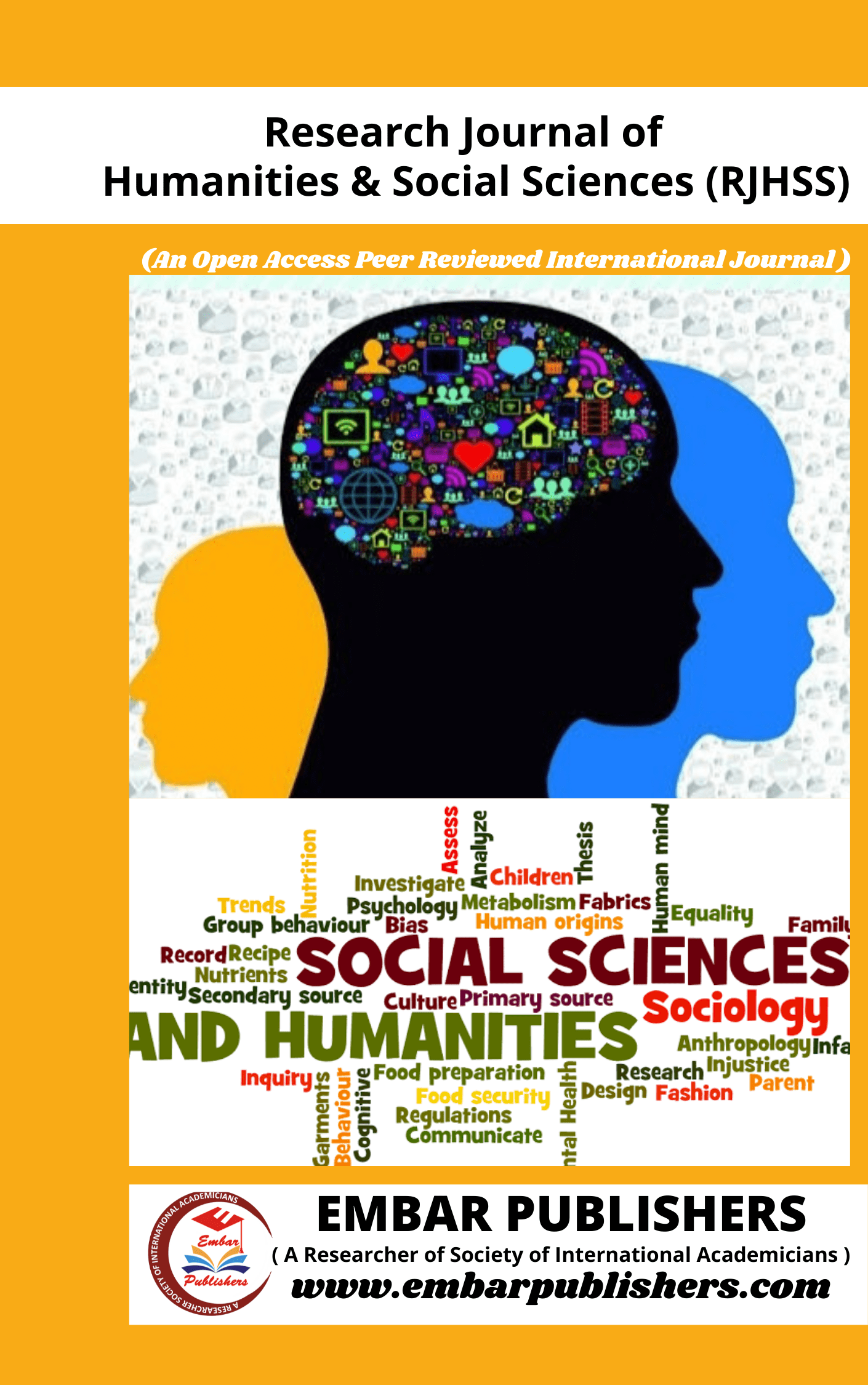
Academic Engagement and Learning Strategies as Predictors of Secondary School Economics Students’ Academic Achievement in Owerri Education Zone 2 Of Imo State
Justice Ikechukwu Okere , Francis Elochikwu Ikeh*
Department of Science Education, University of Nigeria Nsukka
DOI: doi.org/10.58924/rjhss.v4.iss4.p14
Published Date: 19-Aug, 2025
Keywords: Keyword: Academic Engagement, Learning Strategies,Economics,Academic Achievement.
Abstract:
Abstract: This study investigatedstudents’ academic engagement and learning strategies as predictors of secondary school students` academic achievement in Economics. The study was guided by three research questions and three hypotheses. The study was carried out in Owerri Education Zone 2 of Imo State. A correlation research design was adopted for the study. The population of the study comprised of 5,368 senior secondary school II Economics students for 2020/2021 academic session, with sample of 375 SS IIEconomics students. The study adopted three instruments for data collection; Students’ engagement Questionnaire (SEQ), learning strategies questionnaire (LSQ) and Economics Achievement Test (EAT). The internal consistency reliability indices of SEQ and LSQ were determined to be 0.76 and .84 using Cronbach alpha while the internal consistency reliability of (EAT) was .81 using KR-20. Simple linear regression was adopted to answer the research questions 1-2, while research question 3 was answered using multiple regression. However, regression t-test was used to test hypotheses 1-2 while hypothesis 3 was tested using regression ANOVA. All the hypotheses were testedat 0.05 level of significance. The result shows that students’ engagement and learning strategies significantly predicted students’ academic achievement in Economics. Based on the findings of the study, it was recommended among others that, Economics teachers should encourage learners centered method in the process of teaching so that students will be feel free to be involved in teaching and learning.
References:
1. Al-Zoubi, S. M.,&Younes, B. A. M. (2015). Low academic achievement: Causes and results. Theory and Practice in Language Studies,5(11), 2262-2268. DOI: http://dx.doi.org/10.17507/tpls.0511.09.
2. Bobz, L. (2010). Factors affecting academic achievement of students in senior school certificate examination (SSCE) in christian religious knowledge. African Research Review Journal, 4(4), 75-83 doi:10.4314/afrrew.v4i4.69240.
3. Chappelow, J. (2019). Economics: Overview, types, economic indicators. Retrieved from https://www.investopedia.com/jim-chappelow-4684367
4. Delfino, A. P. (2019). Student engagement and academic performance of students of Partido State University.Retrieved from https://www.aubrn.edu.
5. Ezeudu, S. A., Jolaosho, R. A., Yahaya, J. Opara I. E., Babalulu, M., (2023).Effects of two educational technologies on Economics students` achievement in two states colleges of education.IOSR Journal of Research & Method in Education (IOSR-JRME) 10(3) pp49-58
6. Freeman J. R. (2020). Learning strategies.All about learning disabilities and ADHD. Retrieved from http://www.ldonline.org/article/5627/
7. Ghiasvand, M.Y, (2010). Relationship between learning strategies and academic achievement; based on information processing approach. Published by Elsevier Lt. 5 (2010) 1033–497. Doi:10.1016/jsbspro.2010.07.231
8. Idika, E. O., Onuoha, J.C., Nji I.,&Eze, E. (2018). Determination of academic achievement in Economics in public secondary schools in Nsukka local government area, Enugu state, Nigeria.International Journal of Economics Education Research. 1(1) 10-25.
9. Iroegbu, E. E.,&Agboola., M. B. (2019). Student engagement variables and first year undergraduate retention rate in University of Uyo, AkwaIbom State, Nigeria. American Journal of Education and Learning,4 (1) 98-116, 2019. DOI: 10.20448/804.4.1.98.116.
10. Kafadar, T.,&Tay, B. (2014). Learning strategies and learning styles used by students in social studies. International Journal of Academic Research, 6(2), 259-267. DOI: 10.7813/2075-4124.2014/6-2/B.39.
11. Nabizadeh S., Hajian, S., Sheikhan, Z., &Rafiei F. (2019). Prediction of academic achievement based on learning strategies and outcome expectations among medical students. Retrieved from https://doi.org/10.1186/s12909-019-1527-9
12. Nmonwu, L.P., Chimezie, A., Chukwu, I., &Obinna-Akakuru, A. U. (2018). Peer learning strategy and students’ academic achievement in Economics in Imo State. Asian Journal of Economics, Business and Accounting 6(2), 1-7Doi: 10.9734/AJEBA/2018/39490.
13. Nworgu, B. G., (2015). Educational research basic issues and methodology. (6thed) Nsukkauniversity trust publisher.
14. Ohamobi, I.,&Ezeaku, S. (2013). Students’ engagement variables as correlates of academic achievement in Economics in senior secondary schools in Anambra State, Nigeria. Retrieved fromhttps://pdfs.semanticscholar.org/8524/49cb5c671dd133aee7c0f79a392b05e4a327.pdf
15. Okere, I.,J. (2023). School climate, students’ engagement and learning strategies as predictors of secondary school students academic achievement in Economics in Owerri Education Zone 2 Imo State. (Unpublished project in science education university of Nigeria Nsukka Enugu state Nigeria).
16. Onukwufor, J. N.,&Ugwu, C. J. (2017). Self-concept, test anxiety and achievement motivation as predictors of academic achievement in physics among secondary school students in Rivers State, Nigeria. International knowledge sharing platform, Journal of Education and Practice, 4(2),10-25.
17. Oparaji, C. I.,&Ugwu, I. (2019). Self- regulated learning as correlates of academic achievement of students of Economics in secondary schools in Imo State. South Eastern Journal of Research and Sustainable Development (SEJRSD), 2(2).20-25.
18. Agatha MwendeKakui. Historical Background of Konza in Kenya: An In-Depth Exploration. Research Journal of Humanities and Social Sciences.2024 Jan 11,4(4):1-10 DOI :doi.org/10.58924/rjhss.v4.iss4.
19. Széll, K. (2013). Factors determining student achievement.Hungarian Educational Research Journal, 3(3), 55-66. DOI:10.14413/herj.2013.03.06.
20. Singh S. Development of International Regimes for Child Rights.Res J Hum Soc Sci. 2025 Aug 06; 4(4):11-21. DOI: doi.org/10.58924/rjhss.v4.iss4.p2 21. Tomar, S.,& Jindal, A. (2014). A study of effective learning strategies in relation to intelligence level across the science and arts academic streams of secondary level.IOSR Journal of Research & Method in Education (IOSR-JRME), 4 (6), 41-50.
22. Bhagirath Singh Negi. The Impact of Teacher Training on the Use of Digital Technologies in English Language Teaching and Learning.Research Journal of Humanities and Social Sciences.2024 Jan 11,4(1):1-9 , DOI:doi.org/10.58924/rjhss.v4.iss1.p3
23. Uwameiye, B. E. (2016). Co-operative learning Strategy and students’ academic achievement in home Economics.International Journal of Academic Research in Progressive Education and Development, 5(2), 13-20. DOI: 10.6007/IJARPED/v5-i2/2130.
24. Ugwuekpe JL , Abonyi AS, Anugwo AM, Ugwuabo AN, Ikeh FE. Path Analysis of Students’ Cognitive Style, Interest and Attitude on Their Academic Achievement in Biology in Nsukka Education Zones of Enugu State. Research Journal of Humanities and Social Sciences. 2025 Aug 19 ;4(4): 112-122
25. Wara, E., Aloka, J. P.,&Odomgo, C. B. (2018). Relationship between emotional engagement and academic achievement among kenyan secondary school students. Academic Journal of Interdisciplinary Studies. 7(1), 45-66.Doi: 10.2478/ajis-2018-0011

ISSN(Online): 2945-3968
Publisher: Embar Publishers
Frequency: Bi-Monthly
Chief Editor: Dr N.L.N Jayanthi
Language: English
